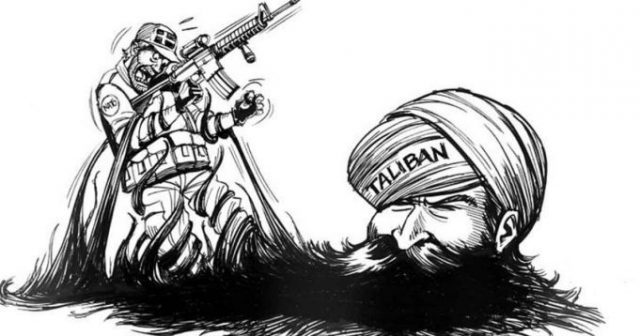News Analysis |
Afghan Taliban have issued a fresh statement regarding the ongoing dialogue process between them and the United States of America, stating that if the U.S backtracked from pulling out its forces from Afghanistan then the group would simply leave the table. The statement has come a week after Taliban denied to attend the second round of talks in Saudi Arabia and demanded a change of venue back to Doha, Qatar.
With 2 years of U.S diplomate Alice Wells’ back-channel contact with the Taliban in Doha and UAE, it was assumed that at least this particular hurdle would have been crossed with one of the two sides yielding to its stance.
“The United States agreed during the Doha meeting in the month of November 2018 about discussing the withdrawal of foreign forces from Afghanistan and preventing Afghanistan from being used against other countries in the upcoming meeting,” the Taliban said. The United States “is now backing away from that agenda and is unilaterally adding new subjects.”
The New Subjects
Point of convergence between the insurgent group and U.S diplomate of Afghan origin, Zalmay Khalilzad, the special envoy appointed by the United States to oversee the current dialogue process was the withdrawal of forces from Afghanistan. It has been repeated rhetoric of the Taliban over the years asking foreign occupant forces to leave the country.
Contrary to this demand, the United States has always urged “an Afghan oriented” solution between the Taliban and the Kabul government. Since the group continued to deny any legitimacy of Kabul government and kept making key strategic combat wins over Afghan forces, the United States government was forced to sit with Taliban one-on-one.
Read more: Afghanistan’s neighbors and the prospect of a US withdrawal
It was all going smoothly as per the Taliban aspirations until the second round of meeting which was scheduled in Riyadh was not attended by the group citing the pressure of Gulf monarchies to include the Kabul regime into dialogue process. Since it is against the categorical stance which the group has maintained over the years, Taliban did not hesitate to out speak against the very Arab country from which they extract a part of their moral and logistic support covertly.
After a statement issued by the U.S embassy in Kabul urging “Afghan-based solution”, Taliban are feeling that the United States is bringing tertiary arrangements into the process which were never a part of agreed agenda over the course of two-year talks in Qatar.
Point of convergence between the insurgent group and U.S diplomate of Afghan origin, Zalmay Khalilzad, the special envoy appointed by the United States to oversee the current dialogue process was the withdrawal of forces from Afghanistan.
“The U.S. goal is to promote dialogue among Afghans about how to end the conflict, and to encourage the parties to come together at the negotiating table to reach a political settlement in which every Afghan citizen enjoys equal rights and responsibilities under the rule of law,” the embassy issued statement read.
Back to Square One
With 2 years of U.S diplomate Alice Wells’ back-channel contact with the Taliban in Doha and UAE, it was assumed that at least this particular hurdle would have been crossed with one of the two sides yielding to its stance. After the first formal convening of all major stakeholders, except the representation of Kabul government in UAE, it was assumed that the United States might have shown flexibility about the inclusion of the Afghan government it has been backing over the past 17 years.
But the events which followed clearly depict that the key hurdle is still very much existent and nothing substantial has been agreed upon regarding that until now. It is obvious that the United States cannot let go billions it has invested in Kabul regime over the years to the drain.
Read more: Repercussions of US withdrawal from Afghanistan
But if it was not properly communicated to the other party and a dialogue process was initiated anyways, it would hurt the requisite trust to build upon such measure to achieve the desired prospects of sustainable peace in Afghanistan. As of now, the developments are pointing to yet another deadlock which would stall the process and extend 17-year long war further.














